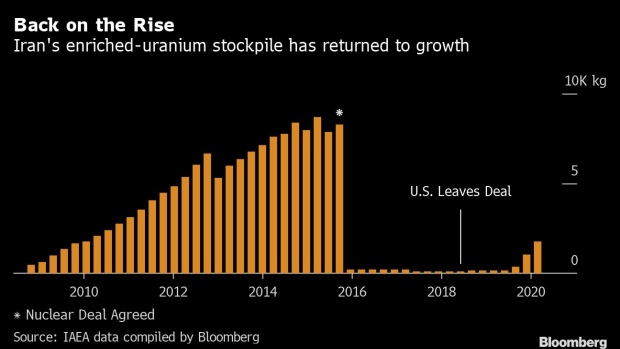Jun 15, 2020
Iran Faces Formal Rebuke for Stonewalling IAEA Nuclear Monitors
, Bloomberg News

(Bloomberg) --
Iran faces its first formal reprimand by international nuclear monitors in eight years after inspectors complained they haven’t be given access to places that may have hosted atomic activities two decades ago.
The resolution drafted by France, Germany and the U.K. asks Iran to “fully cooperate” with the International Atomic Energy Agency’s investigation, according to a single-page document seen by Bloomberg. It would be the first diplomatic rebuke passed by the board of the Vienna-based agency since 2012, and could set the stage for a new round of escalation over Iran’s nuclear program.
“There are areas where our cooperation is ongoing, there are areas where we are in disagreement,” IAEA Director General Rafael Mariano Grossi said Monday at a press briefing. “It’s a mixed bag. I hope we can do better.”
The IAEA reported last month that while its monitors are still conducting record inspections of Iran’s declared nuclear facilities as set out in a landmark 2015 accord with world powers, they want to visit locations where small-scale research with nuclear material may have taken place in the early 2000s. The activity was first revealed in a cache of documents retrieved by Israel. IAEA monitors said they independently corroborated sufficient information to warrant visiting additional sites.
The European resolution, which is expected to win U.S. backing, “expresses serious concern that, for over four months, Iran has denied access to the agency under the Additional Protocol,” according to the document.
The so-called “Additional Protocol” allows the IAEA to call snap inspections and was one of the key concessions won under the beleaguered pact with Iran, abandoned by the Trump administration in 2018.
Iran rejected the accusations and warned “that political criteria in dealing with the tasks and rights of countries in the IAEA will result in nothing but the breakdown of trust and the growth of instability,” government spokesman Ali Rabiei was cited as saying by Fars News Agency.
The resolution will have to be presented at the IAEA’s board of governors meeting later this week, and could be passed by consensus or face a vote by the 35-nation body.
©2020 Bloomberg L.P.






